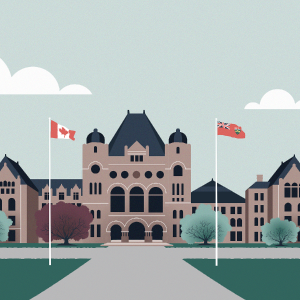On April 8, 2025, the Ontario Bar Association’s Entertainment, Media, and Communications Law Section hosted Entertainment Law Fundamentals at the OBA Conference Centre in Toronto. The event demystified the glitz and glamour of this dynamic area of practice through a candid and compelling conversation with three experienced entertainment lawyers: Laura Wilson-Lewis (Warner Music Canada), Tara Parker (Goodmans LLP), and Adrian Barnardo (Taylor Oballa Murray Leyland LLP).
While many still associate entertainment law with celebrity contracts and high-profile negotiations, the panel made it clear: the substance of the work is multifaceted, technically demanding, and rooted in a deep understanding of traditional legal principles such as contract, copyright, and commercial law, alongside a constant awareness of shifting industry norms and technologies.
Carving a Path in Canadian Entertainment Law
The panel began by reflecting on the evolution of the entertainment legal landscape in Canada. Historically, talent would look to United States-based lawyers for guidance, but as Laura Wilson-Lewis observed, that trend has started to shift. “Canada became the biggest music export, and Toronto was a huge part of that ripple effect,” she shared. The opportunities for legal work in music and other creative industries have grown in step with the booming domestic talent scene.
Laura's own journey reflects this change. She built her own practice, Wilson Lewis Law, during a time when artists were creating at a remarkable pace despite economic uncertainty. From there, she moved in-house at Warner Music Canada in 2022. Her day-to-day now includes negotiating exclusive recording agreements, managing third-party rights, and ensuring the interests of both the business and its artists are protected. “It’s critical to attend events like this,” she said. “They help me keep perspective and get my spark back.”
More Than Red M&Ms: A Reality Check
Tara Parker, who transitioned from corporate commercial law into entertainment, brought her characteristic wit and warmth to the panel. “People think we negotiate for red M&Ms,” she joked. “But we’re dealing with everything from IP to regulatory law, AI, NFTs, publicity rights, and international contracts.”
She emphasized that successful entertainment lawyers need to be excellent dealmakers, well versed in both legal doctrine and industry norms. “You need to understand not just the law, but what’s reasonable in the marketplace. Who owns the copyright? Who has exploitation rights? That’s where deals can be made or broken.” Parker also emphasized the value of soft skills, particularly the ability to communicate clearly and respectfully with clients who often don’t speak ‘legalese.’ “Plain language is not optional. If your client can’t understand you, you’re not doing your job.”
When Bands Break Up
Adrian Barnardo offered a grounded view of the practice, one shaped by his love of music and his unique route into law. A drummer in his twenties, Adrian said, “Law school wasn’t part of the plan, but once I was there, I found my place.”
Today, he works almost exclusively in music, helping artists navigate everything from publishing rights to management disputes. “Sometimes it feels a bit like family law. When a band breaks up, things can get messy,” he explained. “You’ve got to be ready to think on your feet and help bring people back to the table.”
Copyright, Contracts, and Complexity
The panel dug deep into the technical skills needed in the field, especially in copyright law, where understanding the distinction between underlying composition rights and sound recording rights is crucial. Laura noted how label structures often determine who owns what, and failing to parse that out properly can easily lead to infringement.
Contract law plays a central role. Whether drafting deals or litigating disputes, entertainment lawyers must master the fundamentals: consideration, third-party beneficiary clauses, entire agreement provisions, and knowing how to assess a deal from the “four corners” of a contract were only some of the “must-have” elements mentioned in connection with contract law.
Emerging Issues: AI and the Artist’s Voice
One of the most engaging parts of the event was the panel’s discussion on artificial intelligence, which remains a hot and evolving issue. Tara called it the “elephant in the room,” noting how AI is already being used in VFX and voice replication, raising issues of consent and copyright. “We’re seeing it in everything from movies to music. The question is, who gave permission, and do they even know their voice is being used?”
Laura added that Warner Music does not currently consent to the use of its catalogue for machine learning. “Just because someone owns the master doesn’t mean they can use it to train a model. People make a living off this. It’s their livelihood.”
Adrian emphasized that the rapid development of AI means the law is constantly playing catch-up. Questions about data scraping, authorship, and the role of software in creation are all live issues. “Can software be an author? And if so, who owns the result? These are questions we’re only beginning to grapple with.”
Advice for Future Practitioners
The panelists ended with advice for students and early-career professionals interested in entertainment law. Laura encouraged attendees to stay curious and connected. “Read the trades. Learn the cases. Know what's going on in the industry.” Tara suggested following up with speakers and finding creative ways to build relationships. “Can I send you a summary of what I learned? Can I contribute?” were offered as ways to stand out. Adrian urged students to embrace the journey, however unpredictable it might seem. “No one’s path is the same. If you want this career, trust the process and start digging in now. This is your time.”
Speed Networking: Asking Those Burning Questions
In addition to the stellar speaking panel, the event offered a truly invaluable opportunity for roundtable speed networking. Both in-person and virtual attendees had the chance to speak directly with the panelists and other experienced entertainment lawyers. Each round, the mentors generously offered solid advice and insightful tips. This interactive format allowed attendees to delve deeper into the information shared during the main discussion or to pose their specific questions about entertainment law, fostering more direct and personalized engagement. I particularly appreciated this component, as it ensured that every person at the table had a genuine chance to connect with each mentor.
The Entertainment Law Fundamentals event was not only informative; it was also energizing, motivating, and well received. It reminded me that as we peel back the layers of a final piece of work, there is a whole matrix of legal intricacies. Behind every deal, contract, or negotiation is a creative person trying to make a living doing what they love. Behind those people are lawyers who balance the law, are business savvy, and have a deep respect for art. For those willing to jump in and navigate the complexities of the various areas of law that fall under the main heading of entertainment law, you are not only looking at a career, but you are answering a calling.
Any article or other information or content expressed or made available in this Section is that of the respective author(s) and not of the OBA.










